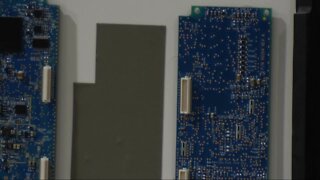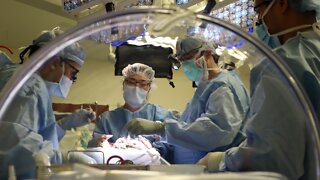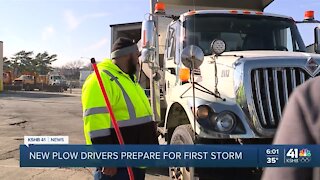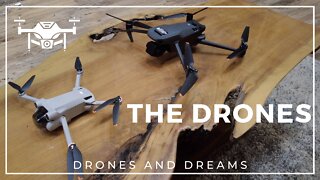Premium Only Content

Fruit-picking drones can solve the farm labour shortage - ISRAEL21c
http://corneey.com/edUBDk
These autonomous pickers can harvest precisely and gently without tiring or needing a break.
By Brian Blum AUGUST 17, 2022, 10:03 AM
A Level Aerobotics FAR on the job in Italy. Photo courtesy of Travel
Fruit rotting on trees or on the ground costs farmers some $30 billion in sales a year. Fruit picked even two weeks late loses 80 per cent of its value.
A major reason for wasted produce: A global shortage of fruit pickers, estimated to grow to five million missing workers by 2050.
Even today, more than 10% of all fruit worldwide cannot be harvested – equivalent to the total annual consumption of fruit in the entire European Union.
What’s a frantic farmer to do?
Well, if you can’t hire workers to pick the fruit, call in the drones.
Israeli startup Tevel Aerobotics Technologies has developed flying autonomous robots (FARs) that take off from a base station, pick only the ripe fruit off the tree and gently lower it for collection.
Because they’re not human, Tevel’s robotic pickers can work 24/7 during the harvest. They never get tired and never need to step out for a coffee or bathroom break.
The robots run on gas and electricity. They’re tethered, so they don’t need to land to be recharged.
Each FAR is equipped with advanced artificial intelligence (AI) that helps it determine whether a particular fruit is ready for picking; the best way to twist and turn the fruit off the branch with its one-meter-long mechanical arm; and whether it has blemishes that make it unmarketable and therefore should be discarded.
“The robots are equipped with sensors and cameras,” Tevel CEO Yaniv Maor tells ISRAEL21c.
“We collect all the information, do data fusion on the video, then run it through our machine-learning algorithms to calculate what is a fruit, what’s the best trajectory to access it, should we pick the fruit by rotating it clockwise or counterclockwise. There are a lot of decisions that need to be taken. And it’s all done autonomously and in real time.”
Onsite training
Tevel’s robots do need some setting up.
“The farmers establish the parameters about what fruits they want to pick, what’s their color grading for [ripeness], what’s the desired weight and size. The robots then follow this,” Maor explains.
Tevel Aerobotics CEO Yaniv Maor in the field. Photo courtesy of Teva
Setup takes one to two hours, with Tevel personnel sticking around for a week to train the farmer on how to operate the system. Travel is also available to work through problems that, ahem, crop up.
In the future, the FARs will be able to prune dead or unnecessary leaves and spray pesticides.
The robots are controlled via an app on a mobile device, which analyzes the data collected for the farmers.
“You can see the amount of fruit picked, its weight, the effectiveness of any pesticide, were there any diseases,” Maor says.
“Data can let the farmer know if he or she should irrigate more or less. They can see which portions of the orchard are yielding more or less fruit, allowing the farmer to know which areas need to be addressed. Farmers are very hungry for this data. The analytics are invaluable for this business.”
Data also helps to manage the packing house. “Today, distributors don’t know what’s in the boxes. They just now they got it from the picker,” Maor says.
about us https://bit.ly/3GUPFOa
Contact us +919942258153 kvk.subadhra@gmail.com
https://fb2a3d1378x9l-c5f2idllhu8n.hop.clickbank.net
-
 3:10
3:10
WKBW
3 years agoLawmakers hope new legislation will eventually solve the chip shortage impacting numerous manufacturers
1 -
 3:17
3:17
Newsy
3 years agoHospitals Use 'Lungs In A Box' To Solve Donation Shortage
1.24K1 -
 2:45
2:45
KSHB
3 years agoMODOT, public works departments work to solve snowplow driver shortage
11 -
 1:18:06
1:18:06
Rebel News
3 years ago $4.60 earnedDAILY | COVID science evolves; radical BC council bans fossil fuels; Canada's labour shortage
10.6K71 -
 4:57
4:57
Drones and Dreams
3 years ago $0.01 earnedThe Drones
16 -
 4:22
4:22
Reuters Innovation
3 years agoMeet the pigs that could solve donor organ shortage
5.2K129 -
 1:29:31
1:29:31
Killerperk
5 hours ago $0.78 earnedRoad to BF6. Come hang out #regiment #bf6
30.2K2 -
 4:35:45
4:35:45
Jokeuhl Gaming and Chat
6 hours agoDARKTIDE - Warhammer 40k w/ Nubes Bloobs and AoA
20.9K2 -
 LIVE
LIVE
Cripiechuccles
7 hours ago😁💚💙MOTA MONDAY WITH CRIPIE💚💙 👌SMOKING, GAMING & WATCHING FLICKS!:😁
32 watching -
 36:11
36:11
Stephen Gardner
5 hours ago🔥'Burn ALL TRUMP FLAGS’ says Tim Walz + Democrat CAUGHT rigging own election!
25K19